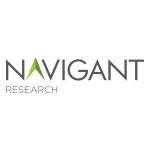Navigant Research Report Finds Combining Last-Mile Logistics and Mobility as a Service Model Benefits Businesses and City Residents
Mobility as a service technologies, along with wireless
communications and automated scheduling, can alleviate last-mile
logistics challenges of parking and congestion
BOULDER, Colo.–(BUSINESS WIRE)–#LastMile–A new report from Navigant
Research looks at the future of last-mile logistics (LML) and
mobility as a service (MaaS), examining how the concepts might work
together to create efficiencies and cost savings.
MaaS, which provides mobility on demand at a lower cost per mile than
owning a vehicle, could offer new options and delivery costs savings for
LML, or the local delivery of food and small packages, as well as larger
items such as consumer appliances. Integrated, shared fleets, as well as
automated driving vehicles are critical for the success of these service
models in the long term, while drones have the potential to become a
cost-effective solution for deliveries to remote locations. Click
to tweet: According to a new report from @NavigantRSRCH,
combining MaaS and LML could mean that operating single-purpose vehicles
for delivery will no longer be necessary for many businesses.
“Congestion and parking in large cities continues to be the biggest
challenges for LML,” says Sam Abuelsamid, senior research analyst at
Navigant Research. “MaaS technologies, along with wireless
communications and automated scheduling, can alleviate these issues
while providing additional benefits to citizens and businesses.”
In the near future, a MaaS model for a city or local region could mean
deploying a fleet of automated vehicles designed to move large numbers
of people to work during rush hour and then deliver on-demand transport
during off-peak hours. According to the report, this type of fleet would
have excess capacity available outside peak hours to perform functions
like small parcel and takeout food delivery.
The report, The
Future of Last-Mile Logistics, explores the future of LML and
examines how it might work together with MaaS. The study provides an
analysis of the main components that enable LML services, such as shared
mobility fleets, automated vehicle fleets, drones, and endpoint delivery
systems. It also examines the key market players in the LML space, as
well as the potential dramatic changes in vehicle manufacturing due to
the new LML service models. An Executive Summary of the report is
available for free download on the Navigant
Research website.
About Navigant Research
Navigant Research, the dedicated research arm of Navigant, provides
market research and benchmarking services for rapidly changing and often
highly regulated industries. In the energy sector, Navigant Research
focuses on in-depth analysis and reporting about global clean technology
markets. The team’s research methodology combines supply-side industry
analysis, end-user primary research and demand assessment, and deep
examination of technology trends to provide a comprehensive view of the
Energy Technologies, Utility Transformations, Transportation
Efficiencies, and Buildings Innovations sectors. Additional information
about Navigant Research can be found at www.navigantresearch.com.
About Navigant
Navigant Consulting, Inc. is a specialized, global professional services
firm that helps clients take control of their future. Navigant’s
professionals apply deep industry knowledge, substantive technical
expertise, and an enterprising approach to help clients build, manage
and/or protect their business interests. With a focus on markets and
clients facing transformational change and significant regulatory or
legal pressures, the Firm primarily serves clients in the healthcare,
energy and financial services industries. Across a range of advisory,
consulting, outsourcing, and technology/analytics services, Navigant’s
practitioners bring sharp insight that pinpoints opportunities and
delivers powerful results. More information about Navigant can be found
at navigant.com.
* The information contained in this press release concerning the
report, The Future of Last-Mile Logistics, is a summary and
reflects Navigant Research’s current expectations based on market data
and trend analysis. Market predictions and expectations are inherently
uncertain and actual results may differ materially from those contained
in this press release or the report. Please refer to the full report for
a complete understanding of the assumptions underlying the report’s
conclusions and the methodologies used to create the report. Neither
Navigant Research nor Navigant undertakes any obligation to update any
of the information contained in this press release or the report.
Contacts
Navigant Research
Lindsay Funicello-Paul, +1 781-270-8456
lindsay.funicello.paul@navigant.com









